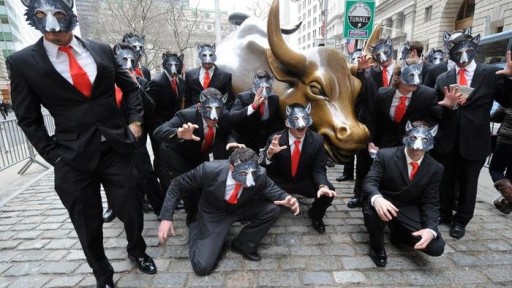
Wall Street Jungle

When it comes wildlife, stock market investors can immediately identify with bulls and bears. But there are other animals in the stock market jungle too.
Bulls and Bears
The bull depicts investors who are optimistic about future prospects of the stock market and believe an upward trending market is on. The polar opposite is the bear: an investor who is convinced that the market is headed for a fall.
It is not clear how the terms originated in this context. Some believe that it was borrowed from the practice of bull-and-bear baiting. Others are of the opinion it is derived from the combat styles of the two animals -- a bear swipes down with its paws where a bull thrusts upwards with its horns.
Stags
This category of market participants are not interested in a bull or bear run. They buy the shares of a company's initial public offering, or IPO, and sell them as soon as the stock is listed and trading commences. They do this with the hope of taking advantage of the rising stock price which enables them to make a fast profit. It is also known as stagging and the individual is known as a stag.
Chickens and Pigs
This refers to individuals who are fearful of the stock market and stay away. Their fear overrides their need to make profits so they stick to conservative instruments such as bonds, bank deposits or company deposits. Their risk tolerance in investment terms is very low. On the other hand, the pigs embrace risk. They are impatient, willing to take a high risk, invest based on hot tips and want to make a quick buck in a hurry. These are the ones who burn their fingers and lose money in the market.
"Bulls make money, bears make money, pigs get slaughtered" is an old saying that cautions against excessive greed and impatience.
Wolves
The animal has been employed as an analogy to powerful individuals who could employ criminal or unethical means to make money. Such rapacious or ferocious individuals are behind scams that jolt the market when it comes to light.
The most memorable example is Jordan Belfort, convicted on charges of stock fraud in his penny stock operation and stock market manipulation. His crimes and lifestyle are depicted in Martin Scorsese's 2013 film The Wolf of Wall Street.
A wolf market is sometimes used to describe the acts of various individuals working together to manipulate the market. For instance, a group of investors may employ "wolf hunting" tactics to drive a company's stock into the ground by selling the stock short.
Dead Cat Bounce
This is stock market slang to refer to a temporary recovery. It could mean a temporary upswing of the market in the midst of a bear run or it could refer to select stocks. A dead cat bounce is a small and short-lived recovery post which the downtrend continues. It stems from the explanation that if you throw a dead cat against a wall at a high rate of speed, it will bounce -- but it is still dead.
Ostriches
Behavioural economist George Loewenstein of Carnegie Mellon University coined the term "the ostrich effect" to describe the way investors stick their heads in the sand during bad markets hoping that their portfolio is not severely hit.
In the investment context, "ostrich" is based on the misconception that when this large bird senses danger it buries its head in the sand. Similarly, investors who exhibit ostrich-like behaviour ignore negative news in the hope that it will go away. After all, if you don't know for sure how your portfolio did, you can always retain the hope that it somehow fared alright.
 Trader Milko Zashev
Trader Milko Zashev Read more:
If you think, we can improve that section,
please comment. Your oppinion is imortant for us.











